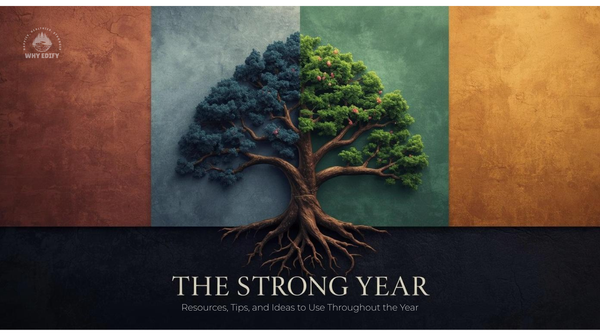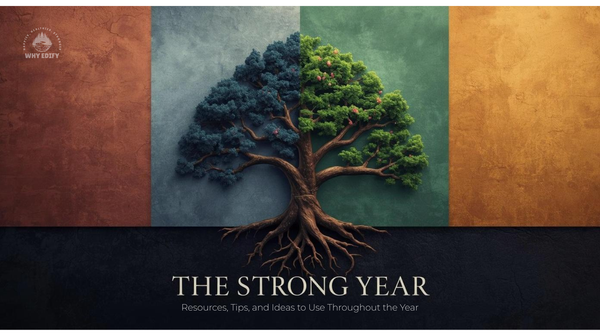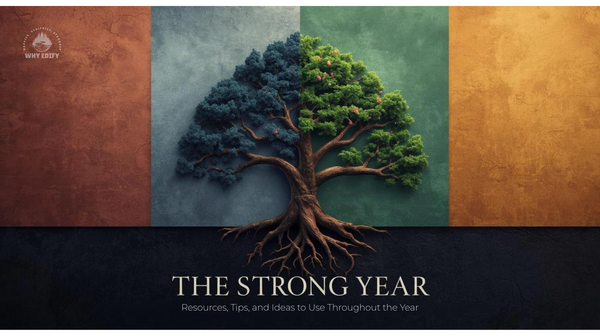What “Younger Next Year” Taught Me About Paying Attention—And Becoming a Better Teacher
A simple daily log can help you care more deeply about life and teaching. Here’s how a powerful idea from Younger Next Year can shift your practice.

As an Amazon Associate, I earn from qualifying purchases. This page contains affiliate links. This helps support Why Edify. Thank You! Read more here.
What “Younger Next Year” Taught Me About Paying Attention—And Becoming a Better Teacher
Receive Email UpdatesWhat Reading Younger Next Year Made Me Realize
Lately, I’ve been thinking about how easy it is to lose track of what really matters—both in life and in teaching. That thought hit me while reading Younger Next Year: Live Strong, Fit, Sexy, and Smart—Until You’re 80 and Beyond.
One section in particular stood out: the idea that one of the greatest keys to caring about your life is simply to watch it.
The authors—Dr. Henry S. Lodge, a Columbia University medical professor, and Chris Crowley, a retired attorney—don’t pull punches. Their message is clear: If you want to stay strong and sharp into your 80s and beyond, you have to live with intention. That means exercising almost every day, eating wisely, and maintaining a deep connection with others. But more than anything, it means noticing your life as you live it.
That’s where the idea of keeping a simple daily log comes in. Not to obsess or nitpick—but to stay awake to your own choices.
The Log: A Simple, Powerful Anchor
One line from the book really stuck with me: “A log is a crutch to lean on when you’re weak.” I’ve felt that. There are days when my energy is low, when I feel scattered, or when the question “What’s the point?” starts to creep in.
The book suggests tracking a few basic things each day:
- What you ate
- Whether or not you exercised
- What you did socially, morally, or with your time and energy
It sounds simple, but it’s deeply grounding. There’s even something historical and sacred about it. The authors point out that captains and commanders have kept logs for centuries—not because they had to, but because paying attention to what’s happening matters.
For me, the log becomes a daily moment of truth. I think this is why I have such a hard time keeping one, especially when it comes to food. Did I live today the way I wanted to? What’s slipping through the cracks? Where am I showing up—and where am I not?
Why It Matters for Teaching
Reading this made me wonder: what if I started logging not just my personal habits, but my teaching days? Not in an evaluative, checklist kind of way—but with honest reflection.
So often, the teaching life moves so fast we forget to see it. We forget what worked in that lesson or what threw us off. We forget which student lit up at a question, or which one shut down.
In the same way a daily log helps you care more about your health, it can help you care more about your teaching practice. It’s a tool to help you break free from autopilot and cultivate awareness.
How Teachers Can Use This Practice
Here are a few ways I think this kind of logging can actually make us better teachers:
1. A Quick Daily Teaching Reflection
Just jot down three things:
- What went well today?
- What didn’t?
- How did I show up—for my students and myself?
No overthinking. Just a few lines. Over time, patterns emerge. You see what energizes you and what drains you.
2. A Classroom Connection Log
Try logging one small connection or conversation with a student each day. It helps you stay focused on relationships, especially during busy stretches.
3. A Curriculum Memory Bank
Use your log to track how lessons actually landed. Did the activity spark engagement? Did you run out of time? Were students confused or curious? Logging this helps make better adjustments next time around.
4. A Teacher Wellness Tracker
Just like in the book—track your energy, movement, food, and emotional state. It’s not about being perfect—it’s about staying aware. You can’t pour from an empty cup.
I used to think logging was just one more thing to do. Now, I see it as one small habit that helps me notice my life—and my teaching. It reminds me what I care about, and keeps me from drifting.
Reflection Question:
What would happen if, for the next two weeks, you watched your teaching more closely—just by writing down a few honest notes each day?
Give it a try. The log doesn’t judge. It just helps you remember to care.
Want more?
✅ Share this post with a fellow teacher who needs a reminder to be present—and spark deeper conversations about living and teaching with intention.
✨ Ready to go deeper? Join the Why Edify Inner Circle—our dedicated community for educators committed to being happier, healthier, and stronger. You’ll get:
- Exclusive resources and member‑only tools
- Access to the Strong Teacher School course + downloadable guides
- A space for real conversations with like‑minded educators
- Newsletter archive access & special shop discounts
- Support for a mission that lives at the heart of teaching
👉 Join the Why Edify Inner Circle
Let’s grow stronger, together.



